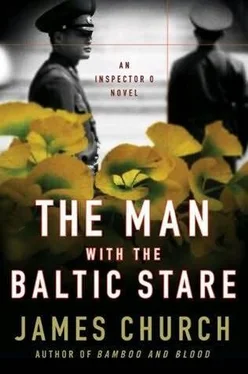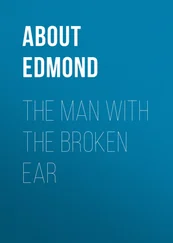Near the post office, up a pleasant street called Travessa de S. Domingos, I came upon a square with a fountain in the middle and a large ficus spilling shade onto a bench. On two sides the square was enclosed by a low wall of blue and white tiles. It seemed like a good place to get out of the sun and even held some promise for a meeting with Kang, if things came to that. No one else was around, so I took the bench beneath the tree.
A few minutes later, Luís walked into the square. He threw a couple of coins into the fountain and sat down beside me. “You keep up a brutal pace in this heat,” he said. “You should slow down a little. Good thing you found this shade. I was about to drop.” He took out a handkerchief and mopped his forehead.
“I thought we had finished our business.”
“So did I. But then a friend of mine asked me to find you.”
“A suite has opened up at the Venetian?”
“Better.” He stood up again and looked over the wall behind us at the street below. “Nobody here but us chickens. Or us people who eat chickens.” He studied his watch. “Lunchtime rolls around again, thank God, and not a moment too soon. In a short while, we’ll have visitors. Whenever I go out, MSS tags along at a respectable distance. They think I’m helping someone launder a lot of money. Me!” He laughed until the tears streamed down his face. “I can’t even wash my own shirts.” His shirt was white and crisp, except where drops of laughter glistened down the front. “Listen closely,” he said, once he pulled himself together. “Remember that fort we saw from the hotel room? The one on top of the hill? That’s where you must meet my friend.”
“I’m inclined not to trust anyone, especially people I’ve never met.”
“This is different. You’ll find out why soon enough.”
I didn’t even try to stop from appearing skeptical.
“I don’t want you to go into this in a state of disbelief, Inspector; it’s bad operational practice. That’s what our manual emphasized repeatedly. Yours did, too, I imagine. Tell me, what’s the matter?”
“Pretty exposed, that location, isn’t it?”
“So! You are a cautious man, Inspector. This caution is impressive. Perhaps where you live it is essential. Here in Macau, however, it can be fatal. The fort is a good choice; I’m sure of it. There’s only one way in. If you’re followed, it will be obvious.”
“Only one way in is fine. It’s the only one way out that worries me. Even if I’m not followed, what about people already in place?”
“You mean MSS? They pulled their surveillance a few years ago. It wasn’t worth their time, they said. Anyway, it’s a very steep climb up there. My people don’t cover it at all.” He shrugged when I didn’t reply. “All right, some security goes up a couple of times a month to make sure the fort is still there. They aren’t due again for another week, and they stick to a regular schedule. They’re afraid what they might find if they go to random visits.”
“We won’t bump into five other operations by five other organizations? The British have friends, the Americans, the French, maybe the Singaporeans. How can you be sure that no one else knows the place is wide open, that it isn’t being watched?”
“Who says it isn’t being watched?”
“Aha.”
“This will work. I know it will because we’ve never done it before, so there’s no pattern and absolutely no trail. They might catch on if we did it more than once, but we won’t. Think of it as a onetime pad.”
“Maybe some rough edges, though? The first time always has rough edges, a few things someone forgets to consider, minor details-the sort that can get a person killed.”
“None, no minor details, simple as rain. Just listen. You go up to the fort at nine A.M. tomorrow. It’s still cool enough then so you won’t give yourself heatstroke climbing that hill. Take a bottle of water with you, to be safe. Look a little touristy; you know the drill.”
“The place will be deserted at that hour?”
“Deserted? Good God, no. There will be squads of old ladies using it for exercise, a couple of tape players blaring that music they need to stand on one leg and sweat. Sometimes they practice with fans; other times it’s with swords. Don’t walk too close or you could lose something. Your main interest is the front wall and the nineteen cannons that line it.”
“Nineteen.”
“Three main groups-five, nine, and five.”
“That’s nineteen.”
“Face the front of the fort. You will see that there are two bulwarks-left and right. This is very common fort architecture for the period.”
“I’ll take your word.”
“Each bulwark has five cannons. For the sake of convenience, we’ll number those in the left bulwark one through five.”
“One through five.”
“Good. Now, forget they’re there. You actually start counting with the sixth cannon. As you face the Grand Lisboa, and you can’t miss it because the damned thing blots out the rest of God’s creation, cannon number six will be the first one on your left along the wall. Use that as an anchor point in your mind; get yourself oriented.”
“Should I close my eyes to imagine this?”
“As you wish. But you don’t want to focus on the left side yet. You want to stroll over to the right bulwark to look for the go, no-go signals. If any of them are missing-any of them-back off.”
“How many altogether?” My memory is normally good, but humidity does funny things with the circuits.
Luís looked up at the sky and counted silently. “Three.” He nodded to himself. “Three. The first and second are in the right bulwark, where you will find that two of the cannons face the front.”
I reached for my pen. “Can I write any of this down? Cannons to the left of them, cannons to the right of them. Maybe a diagram would help.”
“No notes. Just listen. The cannon on the extreme right has the symbol of a crown stamped into the top of the barrel, fairly near the touchhole. I’m supposed to tell you not to touch that hole. I wasn’t told why; I just pass it on. The next cannon over, to the left, has no crown on the barrel. Perhaps it did not get a royal blessing. Purchased in bulk, maybe. Instead of a crown, it has a diamond filled with a cross. Are you following?”
“Got it.”
“Any questions about the cannons?”
“No. Should there be?”
“Trying to cover all the bases, that’s all. If there’s something about a cannon that you aren’t sure of, speak up.”
“Listen, Koreans invented cannons. I know them like the back of my hand.”
“Really? I thought that the Chinese invented them.”
“That,” I said, “happens all the time. We invent something, and the Chinese take credit for it.”
Luís nodded thoughtfully. “Further up, toward the muzzle, you will find the letter M stamped into the barrel. At the bottom of each of the letter’s two main vertical strokes are little feet or platforms.” He drew me a quick sketch on his palm, then spit in his hand and rubbed it off. “If the operation is proceeding, both feet on that M will be filled with a sort of putty. It won’t fall out. The stamp itself is pretty deep. Even if you can’t see the putty, you’ll be able to tell it’s there by running your finger over the letter. People do that all the time, God knows why, so no one will pay attention to you. Anyway, the old ladies don’t use the right bulwark, feng shui problems possibly, so I doubt anyone will be standing around.”
“Next.”
“A half meter or so to the left of the cannon with the M is a round porthole through the stone wall. You can look out through it-that’s what every other tourist has done for the last century. Then another half meter to the left is a triangular storage shed set into the corner of the bulwark. It has a blue metal door, locked with a padlock. I don’t know what’s in there, and I don’t know why they lock it. There are three steps leading up to the door. Each step consists of five or six stones, irregularly shaped, and set in old mortar. On the middle step, on the right side as you face it, is a loose stone. If it’s missing or out of place, you go home and forget we had this conversation.”
Читать дальше












